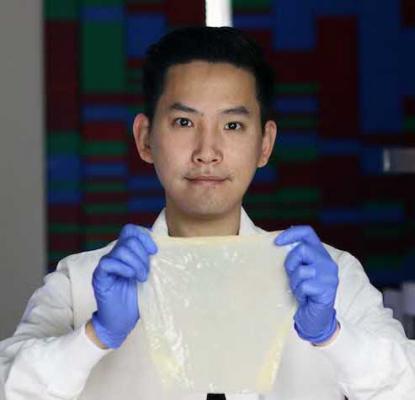Tzu-Chieh (Zijay) Tang
Tzu-Chieh (Zijay) Tang has a passion for building sustainable technologies that are inspired by nature and hopes to help solve the world’s water supply problem. He looks to nature to see how animals or plants address challenges and then develops and implements design principles, informed by nature, through engineering. His focus of study is on synthetic biology that uses gene circuits to let organisms perform desired tasks, similar to computer programming.
Zijay grew up amidst the rich biodiversity of the mountainous hot springs town, Beitou, in Taiwan. Even as a young boy, he appreciated the elegant complexity of organisms and would collect insects and plants to study. He was deeply fascinated by fern leaves, dragonfly wings, and the many forms of mushrooms. His strong desire to examine the underlying mechanisms of nature led him to study biology at National Taiwan University, earning a bachelor’s degree in 2009. He later earned his master’s degree in materials science at the Masdar Institute of Science and Technology in Abu Dhabi in 2014. He is currently pursuing his PhD in biological engineering at the Massachusetts Institute of Technology (MIT).
While many researchers focus on biomedical applications such as diagnostics and therapies, Zijay believes that humankind and planet Earth can also benefit tremendously from the emergence of synthetic biology. He decided to dedicate his career to developing robust living, functional materials and devices that can sense and respond to their surrounding environment. His research led him to invent sustainable applications for water remediation with teams across MIT and Imperial College London. One of his inventions, Syn-SCOBY, was inspired by the symbiotic community of bacteria and yeast (SCOBY) used in the popular fermented tea drink, kombucha. Syn-SCOBY is a pollutant-sensing filter made from only bacteria and yeast. Zijay also developed DEPCOS (DEployable Physical COntainment Strategy) for the safe deployment of engineered microbes for water quality monitoring. His inventive accomplishments earned him the 2020 $15,000 “Eat it!” Lemelson-MIT Student Prize.
In addition to his academic work, Zijay participates in MIT’s Microbiome Club, organizing outreach programs to promote public awareness about microbes and the food/water system. Inspired by the MIT Water Summit, he co-founded a team called Aqua Novus, which focuses on building a low-cost bio-sensing device capable of detecting heavy metal contaminants in drinking water with sensitivities that meet the Environmental Protection Agency’s regulations. Zijay is so passionate about this field that he enjoys leading and educating others. As a graduate teaching assistant, he has mentored several undergraduate teams throughout lab sessions and previously supervised students in their research projects with the Synthetic Biology Group in the Research Laboratory of Electronics at MIT.
Zijay’s work is published in numerous publications and he has received multiple awards, including a 2017-2018 Abdul Latif Jameel Water and Food Systems Lab (J-WAFS) Fellowship for Water Solutions at MIT. He envisions his work will enable engineered microbes to be safely used as economical solutions for a wide range of water monitoring and remediation applications, specifically in remote areas of the world.
Related News Coverage
newTV
MIT News
AZO Sensors


